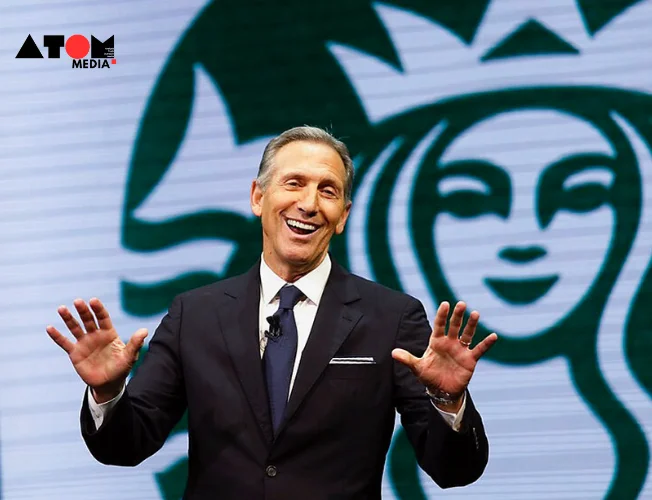Howard Schultz, Starbucks’ enigmatic and famous former CEO, has had a career of reinvention. His three consecutive stints as CEO of the coffee behemoth provide a picture of a leader who is sincerely committed to the company’s success and is willing to take dramatic decisions in times of crisis. One such episode, detailed by Schultz on the podcast “Acquired,” provides light on a critical meeting with another renowned leader: Steve Jobs, Apple’s cofounder.
Schultz’s Tenure: A Story of Ups and Downs
Schultz’s first term as CEO, from 1987 to 2000, saw Starbucks grow from a regional coffee roaster to a global coffeehouse phenomenon. He advocated for the formation of a “third place” – a friendly setting outside of home and work – a concept that customers embraced wholeheartedly. However, however 2008, during Schultz’s second term (2008-2018), Starbucks faced a new reality. The company had grown in size, and some believed it had lost focus on quality coffee, resulting in a poor customer experience. This is the context in which Schultz sought the advice of Steve Jobs, another visionary leader famed for his unwavering pursuit of perfection.
A Candid Conversation on the Infinite Loop
The two titans met in Apple’s headquarters in Cupertino, California, notably the “Infinite Loop” campus, which exemplifies Jobs’ never-ending passion for innovation. Schultz, seeking advice for a failing Starbucks, poured his heart out to Jobs, outlining the company’s problems. Jobs, famed for his bluntness, didn’t mince words. In a move that would become symbolic of their exchange, Jobs reportedly interrupted Schultz’s outburst and provided shockingly clear advice: remove the whole senior leadership team.
Jobs’ Reasoning: A Brutal Necessity
Schultz’s initial disbelief quickly turned to astonishment as Jobs elaborated on his suggestion. Jobs believed that a complete overhaul of leadership was necessary to break free from the status quo and enact meaningful change. He argued that the existing team, likely entrenched in their ways and resistant to disruption, would be an obstacle to Starbucks’ revitalization. Jobs’ conviction was further emphasized by the intensity of his delivery – reportedly yelling at Schultz and emphasizing the urgency of the action with an expletive.
Schultz’s Dilemma: Pragmatism vs. Drastic Measures
Schultz, a more measured leader by inclination, struggled with Jobs’ suggestion. While he saw the need for change, dismissing the entire executive team seems extreme and potentially disruptive. He expressed concern about the operational issues that would arise in the absence of a staff to oversee the day-to-day responsibilities. Jobs, on the other hand, refused to give up. He firmly projected that the majority of the team would leave within a year, showing a lack of trust in their capacity to adapt and lead the turnaround.
The Unfolding of Events and the Weight of Jobs’ Words
As Schultz recounted on the podcast, Jobs’ prediction proved eerily accurate. Within a year, most of the senior leadership team had indeed been replaced. While Schultz didn’t elaborate on the specific reasons for their departure, it likely involved a combination of performance issues, resignations in response to the shifting direction, and perhaps even some direct terminations.
A Missed Opportunity? The Implication of Delayed Action
Schultz later contacted Jobs and confirmed that the senior team had been changed. However, Jobs responded with disappointment. He chastised Schultz for the delay, claiming that a faster implementation of his advise may have resulted in faster results and put Starbucks on a better track sooner. This exchange exemplifies Jobs’ unshakable belief in decisive action and disdain for bureaucratic sloth.
Beyond the Anekdote: Lessons in Leadership
The story of Schultz and Jobs’ conversation offers valuable lessons for leaders at all levels.
- The Importance of Recognizing When Change is Needed: Schultz was willing to acknowledge that Starbucks needed a significant course correction, even though it meant admitting his own leadership might have contributed to the situation.
- Seeking External Guidance: Leaders shouldn’t be afraid to seek advice from those they respect, even if their approaches differ. Jobs’ bluntness, while jarring, forced Schultz to consider a radical solution.
- Taking Decisive Action: While drastic measures should be carefully considered, there are times when decisive action is necessary to break free from stagnation.
- The Power of a Fresh Start: Jobs’ belief in a complete leadership overhaul highlights the potential benefits of bringing in new perspectives and a renewed sense of urgency.
Read more: Marketing News, Advertising News, PR and Finance News, Digital News





